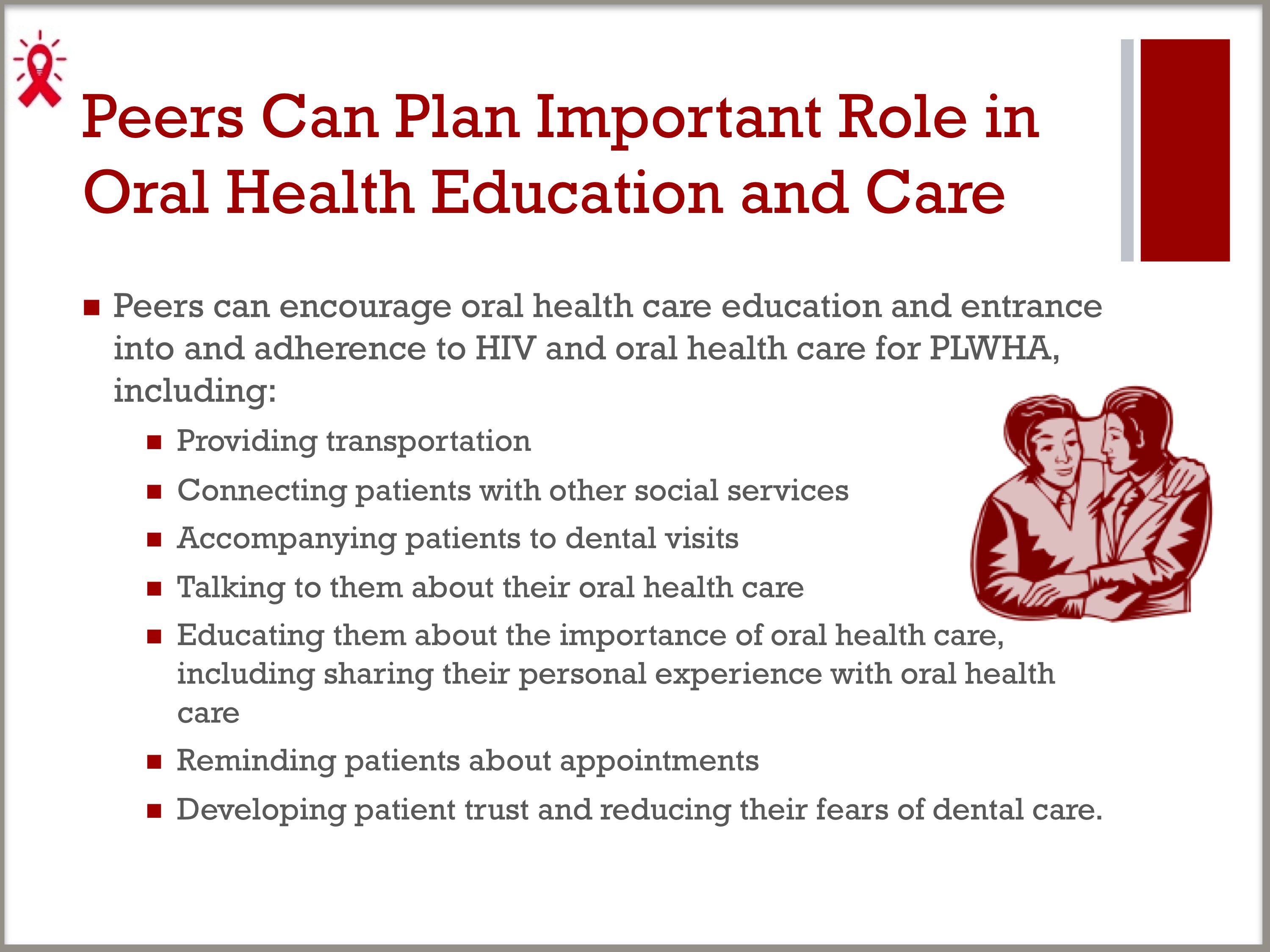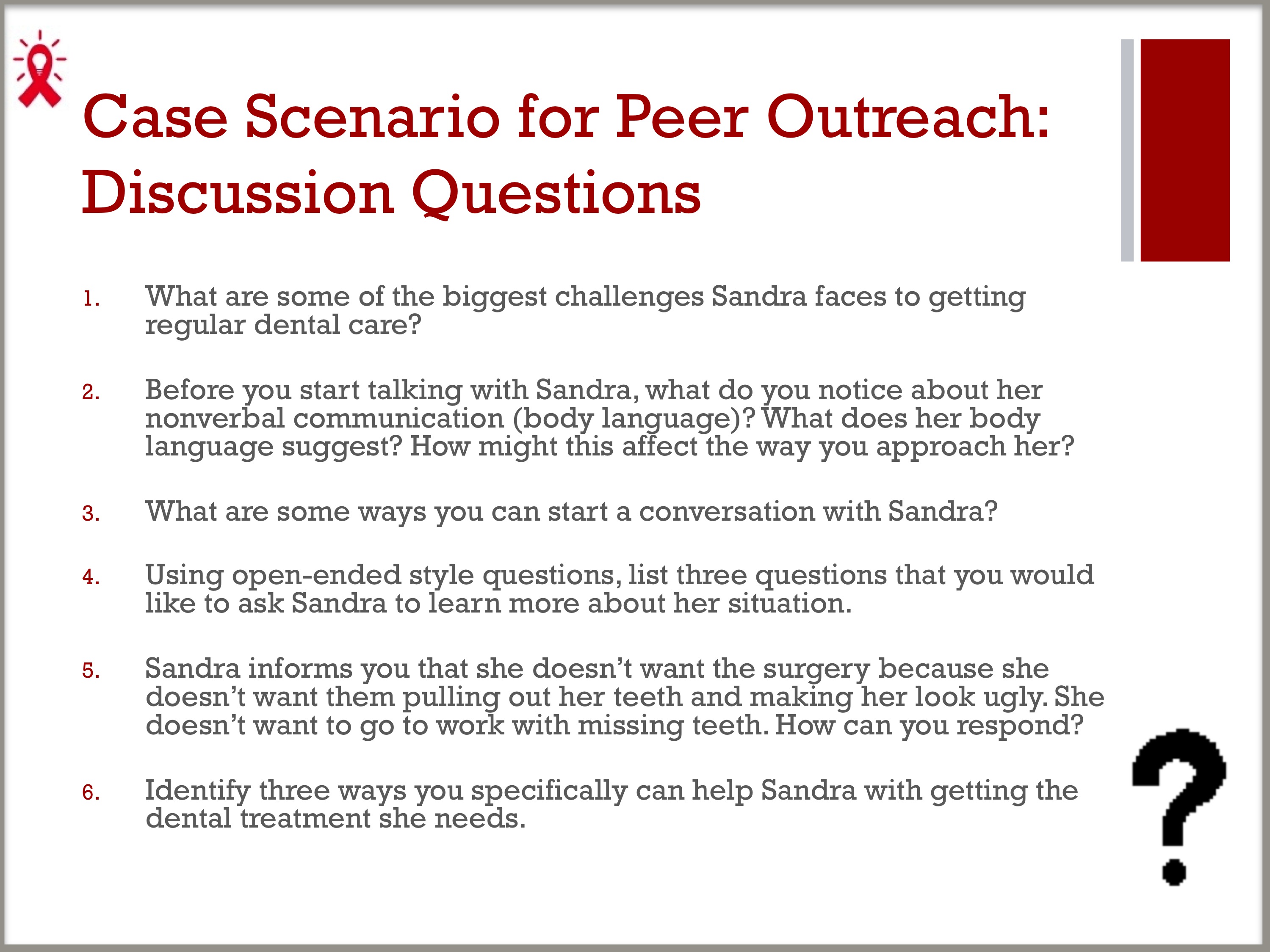Session Length: 30 minutes without playing Peer Jeopardy Group Activity in class - 60 minutes with Peer Jeopardy Group Activity
Summary
Module 9 is intended to be a training for providers, consistent with the rest of the curriculum modules. The module is intended to be for providers to discuss how peers can be helpful in engaging PLWHA in care, and to familiarize themselves with a possible tool to use in peer education and training.
Materials Needed
- Computer and compatible LCD projector to play the PowerPoint presentation
- Copies of the handout (printed out and distributed to each person)
- Timer or watch with a second hand
- Calculator
- Paper for each group
- Pencils or pens for each group
- Prizes and/or a buzzer are recommended but optional.
PowerPoint Presentation
Slide 1: Peers Can Play Important Role in Oral Health Education and Care

Peers can encourage oral health care education and entrance into and adherence to HIV and oral health care for PLWHA, including:
– Providing transportation
– Connecting patients with other social services
– Accompanying patients to dental visits
– Talking to them about their oral health care
– Educating them about the importance of oral health care, including sharing their personal experience with oral health care
– Reminding patients about appointments
– Developing patient trust and reducing their fears of dental care.
Group Activity
Case Scenario for Peer Outreach
- Pass out copies of the handout.
- Have the class read through the case scenario silently.
- Once the class has finished reading the case scenario, have the class split into groups (recommend no more than 5 per group) to discuss the questions and the best way for a peer to approach “Sandra,” the patient in the case scenario below.
- After 5–10 minutes, reconvene the class and lead discussion around the approaches/tactics discussed in the small groups. For each question, encourage the class to think about the kinds of peer training that needs to occur to ensure that appropriate support is given to “Sandra.”
Case Scenario: Sandra
Background
The dental team introduces a new client named “Sandra” and explains her situation to you. They want you to help with getting her into dental care more regularly since she misses a lot of appointments and seems reluctant to complete her treatments. Sandra is 35 years old and in need of a lot of dental work, including some surgery to remove several teeth. She is a single mom who just got her life back together after being homeless and using alcohol and drugs for many years. It was during that time that Sandra contracted HIV through what she believes was unprotected sex. During this period in her life, she rarely sought dental care, and if she did, it was only when she had pain. Sandra is juggling two jobs and dealing with a legal issue to regain full custody of her daughter. Sandra seems very self conscious when she speaks to anyone, and she always covers her mouth, as she has some decayed and discolored teeth. She has expressed an interest to go back to school to get her Associate’s Degree and a better paying job but, in her opinion, she doesn’t have the “smarts” or the time to think about school. She smokes about a pack a day to help calm her nerves even though she wants to quit. As you go to approach her outside, in front of the waiting room to the clinic, she is smoking a cigarette sitting on the steps and she does not make eye contact with you.
Discussion Questions
- What are some of the biggest challenges Sandra faces to getting regular dental care?
- Before you start talking with Sandra, what do you notice about her nonverbal communication (body language)? What does her body language suggest? How might this affect the way you approach her?
- What are some ways you can start a conversation with Sandra?
- Using open-ended style questions, list three questions that you would like to ask Sandra to learn more about her situation.
- Sandra informs you that she doesn’t want the surgery because she doesn’t want the dentist pulling out her teeth and making her look ugly. She doesn’t want to go to work with missing teeth. How can you respond?
- Identify three ways you specifically can help Sandra with getting the dental treatment she needs.
Source: Adapted from the Peer Education and Evaluation Center’s HIV and Oral Health Module.
Slide 2: Case Scenario for Peer Outreach: Discussion Questions

- What are some of the biggest challenges Sandra faces to getting regular dental care?
- Before you start talking with Sandra, what do you notice about her nonverbal communication (body language)? What does her body language suggest? How might this affect the way you approach her?
- What are some ways you can start a conversation with Sandra?
- Using open-ended style questions, list three questions that you would like to ask Sandra to learn more about her situation.
- Sandra informs you that she doesn’t want the surgery because she doesn’t want them pulling out her teeth and making her look ugly. She doesn’t want to go to work with missing teeth. How can you respond?
- Identify three ways you specifically can help Sandra with getting the dental treatment she needs.
Keep Slide 2 projected during group discussion and full class discussion as guide.
Group Activity
HIV Oral Health Jeopardy Game for Peers
- Provide each participant with an electronic copy of the Jeopardy game PowerPoint presentation and Answer Key handout.
- See page 2 of the handout at follow instructions given for the game, and take the class through a few or all questions in the game.
After reviewing the game materials or playing the game, lead the class in discussion about ways to use this game in peer training:
– Do you think this game would be an effective teaching tool for peers?
– If yes, why? How could we incorporate this into our peer training?
– If not, what could be improved to make it a better fit for peers in our program?